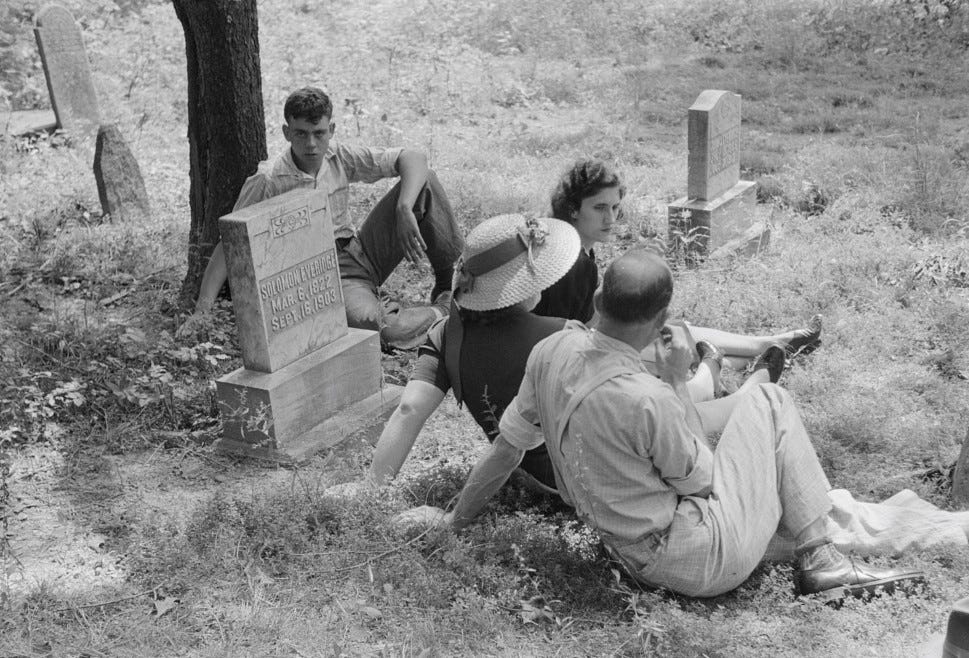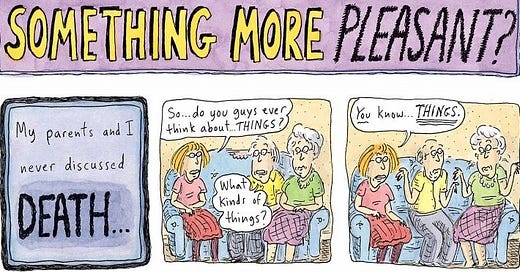
March takes on an earthy scent as the ground begins its spring thaw. Spring will arrive in two weeks. Ramadan, Easter, and Passover celebrations must be planned. Trees and shrubs bud, snowdrops and crocuses pierce the ground. Sunlight sharpens with a strengthening brightness. Fashion turns from wools to cottons and chiffons. The new season’s wines shove aside heavy reds.
All around, it is a fine month, indeed, unless you have stood beside too many open graves. When the soil softens and the days brighten, our family begins to think of March as the burying season.
Our mom died on the 8th, our dad on the 11th. Our great-grandfather passed away on the 15th and our grandfather a year later on the 31st. My mother-in-law died two weeks after my dad, on the 22nd.
This may not be a fact you’ve ever yearned to know, but March is consistently listed as the third most popular—if you can call it that—month to die. January is always first, followed close behind by December, the reason given that the increasing darkness and sudden cold shocks depleted souls and frail bodies. Weather plays a role in March’s mortality, as well, but there’s also a popular theory that willpower fuels perseverance through February in order to shelter the family from heartache during the holiday season.
At this point you may be wondering why in God’s name do you need to read any further. You may be sympathetic about this whole family burying season shenanigans but not enough to be interested in hearing anymore about it. That’s totally understandable, and I’m really okay with that.
But, hold on a minute! Did you know that March ushered in annual graveyard gatherings, especially in the South, particularly in small towns with cherished family plots and tiny churchyards? That people looked forward to assembling a party among friends and relatives, the living and the dead? Or that they toted along large picnic baskets heavy with enough dishes to share at midday along with old stories and new local gossip?
Then let me tell you how the burying season sometimes makes for a spirited celebration of life.
A country burial does not have the boards of trustees, the landscape experts, the corps of gardeners, the gasoline lawnmowers, and the other appurtenances of the city cemetery: it has only the reverence of the people for the bones of their progenitors. ~From the Arkansas Writers' Project, Federal Writers Program, 1940.

The official guide for having a fun cemetery cleaning day with friends and family!
Compiled from the Works Progress Administration’s Mississippi, Arkansas, Florida, and South Carolina offices.
No matter where your people are buried or what fine season you choose to tidy them up, the following implements will be called for:
A good rake
Sturdy hoes
Spade
Grass cutters
Tree saw
Pruning shears
Garbage bags
Crowbar in case stones need to be straightened
A good stiff brush and a bucket
A jug of water in case there isn’t water available
Flowers and/or small shrubs
Begin by attending to one’s own family lot, then help those with larger plots, and finally work on the graves of those who have no surviving relatives.
First, cut the long grass and rake up the clippings. Cut down any overhanging tree branches. Prune shrubs and rose bushes. If necessary, put to right and shore up the family tombstone. Gently scrub the stone to loosen dirt and moss. Be careful not to scrub so rigorously that you damage the stone. Plant flowers and shrubs to the side of the marker in a manner that does not obscure the epitaphs.
Favorite cemetery cleaning day dishes
Fried chicken (universal favorite)
Potato salad
Pickles
Biscuits
Hard-boiled eggs
Cheese and meat sandwiches
Various preserved fruits and pickles from the cellar
Watermelon—pickled rinds and/or fresh
Pies of all sort
Chocolate, banana, and pineapple cakes
Tea and coffee
Sweet milk for the children
No one is expected to keep to themselves, for to eat from one’s own basket would show a lack of appreciation for a neighbor’s cooking. Wander about among the gathering, selecting at will the dishes and praising the contributions of friends and neighbors.




I remember your February's well, your third son coming into the world and the horrible day your dad died. I get it, how it can be depressing. It's always bittersweet. Then again, wandering about you read some pretty wonderful epitaphs, a lot that makes you smile. Someone sent me one with a mother's chirstmas cookie recipe on it!
Two comments, Pat: 1) I've been told, but never heard it said directly, that the old-timers here in Maine used to refer to "getting over March hill"--if you made it, you were pretty much good to go for the rest o the years; 2) Memorial Day in New England used to be called Decoration Day, and it was the day to take bunches of flowers to the cemetery to decorate the graves of those who had passed. No picnics in the cemetery (we reserved those for backyards or down to the shore) but it was a time for gentle contemplation and recognition, of both the living and the dead.